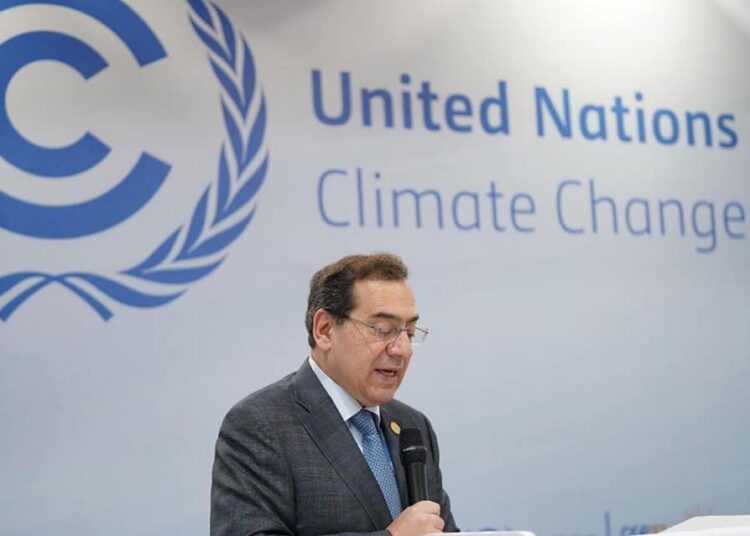Minister of Petroleum and Mineral Resources Tarek el-Mulla and US presidential envoy for climate, John Kerry, inaugurated on Friday the activities of the Decarbonization Day, within the framework of United Nations Climate Summit COP27, currently being held in Sharm el-Sheikh.
Head of Programmes of Third World Network Meena Raman, and Gerd Müller, the Director General of the United Nations Industrial Development Organization (UNIDO), attended the session.
This is the first time such an event is included in a climate conference or summit.
Mulla reviewed Egypt’s plans to make oil and gas industry reach neutral carbon.
He also discussed the challenges of this target and the commitments to increase the ambitions in this regard.
The minister of petroleum underscored the importance of investing in the decarbonization of the highest emitting sectors, as well as identifying new technologies to further streamline the process.
He stressed that energy is indispensable to achieve economic growth and sustainable development, noting that it is important to provide sources of energy needed for sustaining life in environmentally friendly ways, but with minimal impacts on the climate.
El-Mulla underscored that the oil and gas industry has an effective role to play in the green energy transition.
A number of oil and gas companies have already started to take actual steps towards eliminating carbon emissions and switching to green energy transition, the minister went on to say.
Mulla confirmed that Egypt is the first country to provide an opportunity for the oil and gas industry and its international companies at the climate summit to present their actual plans for environmental improvement and reducing emissions from the activities of this industry by using the latest technologies.
“International companies operating in Egypt are working in co-operation with the petroleum sector on many initiatives and projects aimed at reducing emissions along with achieving carbon neutrality,” the minister said.
Mulla pointed out that time is not on our side, and we must focus more on effective implementation and achievable results. “It’s high time for real implementation and tangible actions, and there is no room for pledges and promises only,” he said.
Egypt possesses an abundance of land, sunny weather, and high wind speeds, making it a prime location for renewable energy projects, he said.
Egypt is working on increasing the supply of electricity generated from renewable sources to 20 per cent by 2022 end and 42 per cent by 2035, with wind providing 14 per cent, hydropower 1.98 per cent, photovoltaic (PV) 21.3 per cent, concentrating solar power (CSP) 5.52 per cent, and conventional energy sources 57.33 per cent. This plan is being revised and waiting the approval of the supreme council for energy to reflect 33 per cent of energy generated from renewable energy by 2025, 48 per cent by 2030, 55 per cent by 2035, and 61 per cent by 2040. This is believed to be a very optimistic plan. The private sector is expected to deliver most of this capacity.
Addressing the same event, John Kerry said that Sharm el-Sheikh climate summit is the beginning of implementation, and we must work hand in hand to mitigate the negative effects of climate change on humanity.
He pointed out that the energy transition requires more efforts and comprehensive integration of all world countries.
If we do not get rid of harmful emissions, Kerry continued, we will harm humans, as there are 15 million people dying from the effects of global warming annually.
Kerry stressed that the 20 largest countries in the world are responsible for 80 per cent of emissions and must change that attitude.
“At the Sharm el-Sheikh summit, world governments must take strict measures to mitigate the negative repercussions of climate change and rising temperatures,” Kerry said, adding that new technologies must be used to implement the application of new and renewable energies.
The world countries should work harder to remove carbon and increase the share of renewable energy consumption.






Discussion about this post